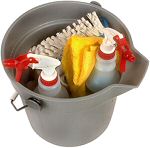Reducing Toxin Exposure from Household Cleaners
Summary: Avoid toxic household cleaners as much as possible. Some generally non-toxic ones are the following:
Dr. Wood's soaps for handsoap and dishwashing
Earth Friendly Products
Miracle II Soap
Cleaners recommended by Hulda Clark
Borax for washing clothes, in automatic dishwashers, and for scouring.
Bleach (plain Chlorox) for disinfecting and cleaning unless there are mental problems with anyone in the household, especially senile dementia.
Vinegar mixed half and half with distilled water for cleaning glass.
Baking soda for scrubbing and cleaning.
Vodka or grain alcohol for glass cleaning and disinfecting.
Orange oil for cleaning wood floors and furniture
 Soapworks and Shaklee household cleaner products are advertised as toxin free,
but repeated inquiries to the companies asking the source of specific
ingredients, like glycerine, yield no response.
Soapworks and Shaklee household cleaner products are advertised as toxin free,
but repeated inquiries to the companies asking the source of specific
ingredients, like glycerine, yield no response.
Earth Friendly and Bi-O-Kleen products are widely available at health markets. They sell all types of household cleaning items and are a good choice.
Dr. Wood's makes many different types of lye and fat based soaps and cleaners which are safe. Their body care soaps are generally harsh and tend to give one a "lardy" smell when used long term, but as household cleaners they work fine. A good selection of Wood's products is available at iHerb.
Miracle II Soap is a better choice for most cleaning needs. It is toxin free, but does contain a coconut-based surfactant, which some are sensitive to. It is colored green and scented by green vegetable extracts, not dyes. Miracle II green soap is excellent for most cleaning around the home, including as soap, hand soap, shampoo, body soap, floors, dishwashing, automatic dishwashers, clothes washers, floors, etc. Although it is an industrial strength degreaser, it is gentle enough for babies. It is, well, a miracle soap, and highly recommended by Electroherbalism.
Borax is cheap and works fine as an automatic dishwashing detergent. It can also be used alone for washing clothes, but is not that effective for heavily soiled clothes. Borax can be made much more effective by adding a couple of teaspoons of Dr. Wood's soap to a full load of wash. Too much and foam may erupt during the wash cycle. Miracle II soap also works well as a clothes detergent used in small amounts.
White vinegar can be mixed half and half with water to make a glass cleaner that also works okay as an all-purpose cleaner. Also can mix a cup of straight vinegar in a gallon of hot water to clean heavily soiled wood floors. For regular cleaning of wood floors, the best cleaner and preserver is orange oil. Now brand orange oil costs around $3 per ounce, which is 6 teaspoons. Mix a teaspoon into a half gallon to gallon of hot water for wood floors. Put a few drops on a clean cloth for dusting wood furniture.
Orange oil, as well as most other steam distilled oils, are safe from a toxin viewpoint. Orange oil is an excellent cleaner. Instead of mixing it directly in water, one can make a mix of 4 ounces in a quart of water with a teaspoon of Miracle II soap to make a base for cleaning floors - add two ounces of this mixture to a half gallon of water to clean wood floors and other surfaces. A teaspoon or two of orange oil in a 22 oz bottle with a few drops of soap is the typical recipe for orange spray cleaners. Making it oneself is very inexpensive if the orange oil is purchased cheap. Now is usually a good value, but a far less expensive source is to purchase orange oil directly from iHerb or Bulk Apothecary.
Vodka and other drinkable alcohols, especially pure grain alcohol like Golden Grain, make the best all-purpose and glass cleaners. Cheap vodka costs around $12 for a big bottle.
The following article was written by Ange Foret and gives more recipes for household cleaners. They all look good except where she recommends using "fabric softener sheets", those smelly things that are put in dryers to reduce static and give clothes a toxic "spring-fresh smell."
Household cleaner recipes by Ange Foret |
Feedback and Comments Note: This comment was made before Seventh Generation products were removed from the recommendations: ----- I was reading information on your website on Reducing Toxin Exposure from Household Cleaners. You seem to recommend Seventh Generation products. snip- Seventh Generation household cleaners (a full line of them, including dishwashing, autodishwashing, clothes, general cleaners, even a toilet bowl cleaner.) I had an experience with their dishwashing soap. I became aware of the ingredient SLS. It is a sulphite thatis made in many forms so as not to be as irritating as SLS. Sorry I can't spell it. It is also synthetic.I purchased the dishwashing product and got sick 1 minute after putting my hands into the soap water. I emailed the company and asked if they had that ingredient in their soap. They do not have an ingredient list on the bottle. They wrote back and said they use another form of sulphite in their soap, not the SLS, and that is in the same family. Also they consider this to be a good product even though it takes years for this soap to biodegrade in the environment. I don't know why you recommend this company on your website. I had found a dishwashing product from the company Bi-O-Kleen, that does NOT have this toxic substance in it. I would like you to list this company over the other one. I am not affiliated with the company. Just a person who kept getting sick buying products that promote themselves as being safe. I won't buy any product that won't list the ingredients on the bottle anymore, no matter if they call themselves natural or organic. Elizabeth D. |